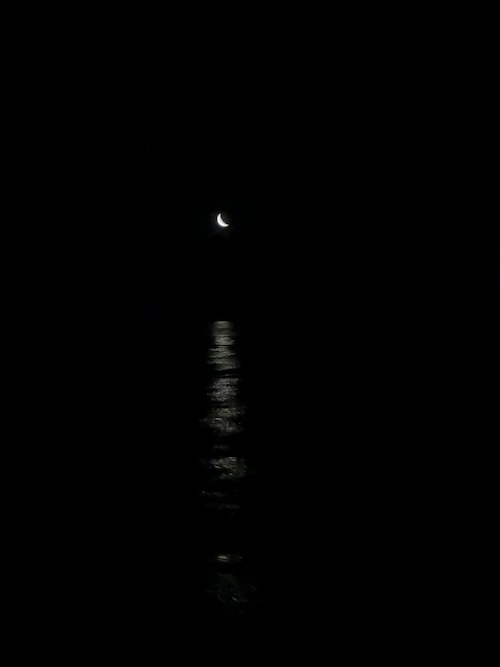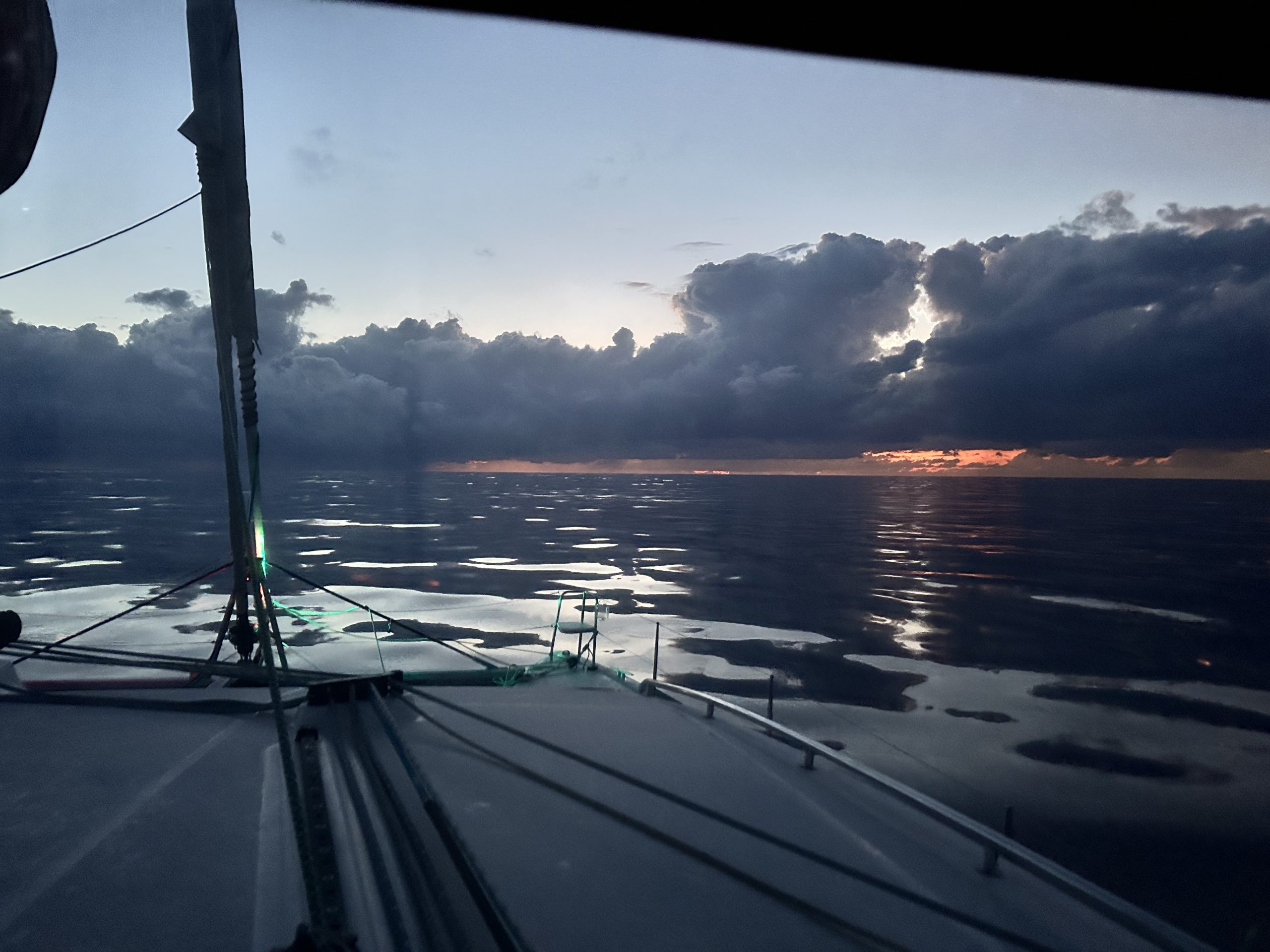
View of St. Augustine from boat cockpit upon arrival.
This was it—my first real adventure on a sailboat beyond coastal cruising, captained charters, and ASA 101 classes. As someone who craves adventure, life experiences, and has a deep love for the ocean, this was a dream come true.
But wait, let me back up. How did this all come about, considering we’re landlocked?
It started when Mr. Knight and I went down to St. Augustine, Florida, to look at boats, dreaming about our future circumnavigation of the world—though we quickly learned not to say that aloud. Sailors are superstitious, so now when asked, we say we're planning to sail the East Coast of the USA, the Bahamas, the Caribbean, and head to Panama. From there, we hope to transit the canal and sail to French Polynesia.
But I digress. During our boat shopping trip, we met up with some sailors we'd befriended on a previous visit to Florida. We were hanging out on their lovely boat when a marina neighbor came over and invited us to tour her boat, which was on our list to check out anyway. After the tour, as I was disembarking, she casually mentioned a transit from St. Augustine to Virginia. Of course, I chimed in, "If you need any help, let us know."
To my surprise, she handed me her boat card and said to email her—they'd love to have crew on board.
My body trembled with excitement. A transit? Yes. I’m your crew!
For the sake of time and not turning this into a novel-length story, I’ll summarize and state that I emailed, they responded, and we made plans. Later, we discovered the captain never thought we'd actually join them, and we never thought they'd actually invite us! Ha! Oh, and remind me to tell you about what our kids and their family said about sailing a week with strangers.
But for now, plans were set, so I picked up the rental car, and we were off on our six-hour drive. When we arrived at the dock in the dark of night, the bay as calm as a sleeping baby, I finally settled into believing this was really going to happen.
We boarded the dinghy, and the captain drove us under a bridge and by some other boats in the dead calm to board a 45-foot catamaran.
I knew I’d never sleep that night, so I was thrilled after a quick chat and tour when the captain said, “If you guys aren’t too tired, how about we go ahead and leave?”
“Yes!” and “Yes!”
I wanted to get behind that helm and take us out of there, but with my experience and skill level at zero compared to the captain’s ten, I settled in to watch, eyeing the markers and navigation equipment, eager to get the sails up and hoping for wind beyond the bay.
It took a few hours to motor out, but it felt like minutes. The novelty started wearing off, and after a long drive (in which I was the sole driver due to the rental car agreement) and sleepless night prior, the hum of the engine and slight rocking challenged my ability to focus. But I didn’t want to be the weak link, so I forced my eyes open and walked around the cockpit to stay awake. When I discovered I wouldn’t be on watch the first night, I collapsed into the super comfy bed in the port hull—our home for the next four days and four nights.
But it was hot and rocky until late in the night when rain hit, cooling the boat but forcing me to close the hatch, cutting off the airflow. I woke nauseous. I went to the cockpit to get some air, but everything was battened down due to the rain, so I still struggled with the queasiness.
No coffee for me. Tragic, I know.
Side note: I’ve never been seasick in my life. I’ve been on the ocean, in rivers, on catamarans, monohulls, speedboats, skydiving, rock climbing, scuba diving, rappelling, walked on glaciers, drove on a racetrack, and ridden with my husband on mountain roads in his 911. Never have I ever been motion or seasick.
I couldn’t believe it was morning one and I felt green. I didn’t want to admit it because it could put a big question mark on our future plans. I didn’t want the captain or admiral of the boat (a.k.a. captain’s wife) to know I wasn’t feeling up to the task of sailing, nor give my husband reason to question my sanity in wanting to sail around the world when I couldn’t make it one night on glassy water with no wind.
The admiral asked if I was okay, and I blurted out my whispered confession. Since I struggle with side effects from medications, I didn’t want to take Dramamine, but another hour later with my stomach swirling faster than a waterspout, I caved. Surprisingly, it didn’t knock me out, but it also didn’t relieve my nausea.
I began to question myself. What if I can’t do this? What if I can’t sail because I’m always sick? No. I won’t accept that. I returned to the helm, and my husband opened the side enclosure. Air flowed over my face and into my lungs, straight to my stomach. It swept away any hint of nausea in one exhilarating and soothing breath of fresh ocean air.
I’d found my happy place.
But while not feeling well, I hadn’t asked any questions. My husband—an IT guy with an engineer's brain who can rebuild a car—had already done a transit and was up to speed with navigation and radar and all the important parts you need to understand before doing a night watch. He sat tall and confident at the helm.
Me, not so much.
I eyed the neatly printed schedule with color coding (something this dyslexic appreciated), and my excitement turned to apprehension. In a matter of hours, I’d be alone at the helm on a dark night with nothing but a sliver of the moon to light the way. I’ve never shied away from a challenge before, and I wouldn’t now.
To my relief, my husband showed me how to drill down into the boats on the AIS to see their distance. That’s all I knew as I took the helm from the admiral at eleven and realized I could barely see the sails and had no idea if I could even turn the boat based on the wind direction. So there I was on my first EVER night shift, trembling with delicious anticipation.

The only light to guide me.
The captain, a smart man, slept in the cockpit, so at least I could ask him a question if I needed to. I sat white-knuckled, watching each boat, some popping in and out of AIS, especially the military ships. But what if I didn’t see something? This wasn’t my boat, and I didn’t want to break anything.
When my uneventful shift ended at two in the morning, every muscle in my body breathed a sigh of relief. I stumbled to bed and fell into the deepest sleep I have had in years. I’d done it—I’d overcome seasickness, sat my first watch without breaking the boat or running into something, and I LOVED it.
The next morning, I awoke, had a cup of coffee, and sat at the helm, relishing the time up there, watching various sights.


Time flew by with the entertainment of playful dolphins, the fresh ocean air, and the soft flapping of a sail when we rode a wave with the wind propelling our boat along, aided by the Gulf Stream current. No motor, no car horns, no lawnmowers or barking dogs—just soothing quiet. There is no better feeling in the world (excluding family and life events) than being eighty miles offshore with nothing around but wind and ocean. The peace that fell over me is inexplicable.

I was home.
My boat home. At that moment, I could have stayed in that spot for weeks instead of days, but like any bright sunlight, clouds closed in on us, dulling the light in the world. The absence of the moon enveloped us in obsidian. And when it was the darkest of nights, it hit—the storm that would test my husband, myself, the admiral, and the captain. The scariest night that made me question my dreams.
And I was on watch…alone.
To be continued…
